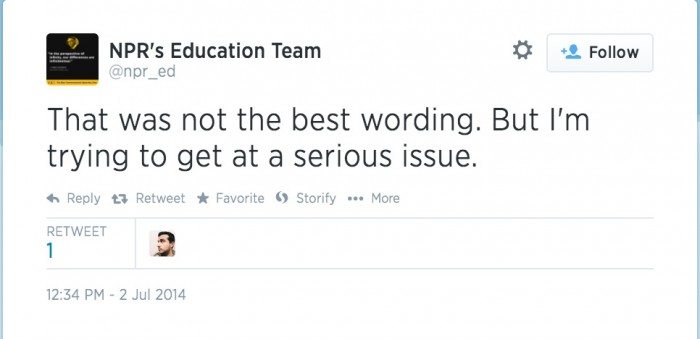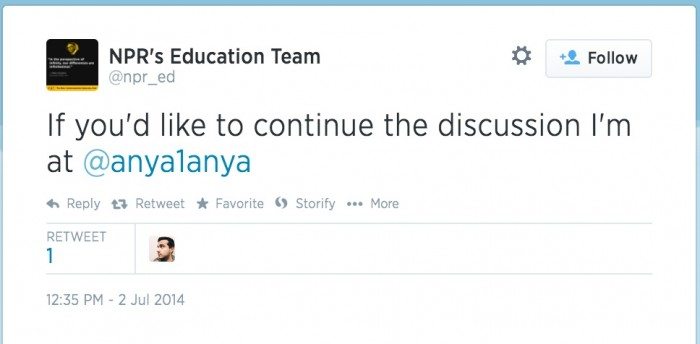UPDATE, July 8, 2014: How has NPR responded? With a memo.
Granted, we were focusing on other serious matters over the July 4 weekend, but when a Twitter follower tweeted the following to us, we admittedly did a double-take:
@npr_ed wtf? seriously? #nomames @latinorebels
— elena mary (@ElenaMary1) July 7, 2014
We checked it out and sure enough, the tweet from an official NPR account did indeed tweet it out. So we screen grabbed it (thinking that, of course, someone would delete the tweet immediately) and shared the image on Twitter. It took off last night:
Actual tweet from Twitter profile of @npr_ed. WTF. Read on. pic.twitter.com/I12z6s62Ck
— Latino Rebels (@latinorebels) July 7, 2014
After that tweet, these two followed:
Then we did a little more digging and realized that the profile behind the NPR account, education blogger Anya Kamenetz, had already tweeted an apology from her personal account.
I acknowledge my responsibility for not cultivating a stronger, more diverse network of sources. I’m trying every day
— Anya Kamenetz (@anya1anya) July 2, 2014
Today, The Daily Dot published a very solid piece about Kamenetz’s tweet and the initial negative reaction it received, but since we weren’t fully aware last night about Kamenetz’s tweet apology, we still asked Kamenetz about the July 2 tweet. Here is what she told us (which to be honest with you, wasn’t any better than the official NPR ones from July 2), as well as someone else who claimed we were going after “a pound of flesh:”
@anya1anya what did the tweet from @npr_ed mean? Really shameful on your team’s end.
— Latino Rebels (@latinorebels) July 7, 2014
We have asked @anya1anya of @npr_ed team why its shameful #tweet was shared in the first place. Still no answer.
— Latino Rebels (@latinorebels) July 7, 2014
@latinorebels @npr_ed hi please check my timeline. I wasn’t on Twitter late Sunday night.
— Anya Kamenetz (@anya1anya) July 7, 2014
@latinorebels @npr_ed yes. Clearly that was a big mistake!
— Anya Kamenetz (@anya1anya) July 7, 2014
@latinorebels @npr_ed don’t blame my team. It was me.
— Anya Kamenetz (@anya1anya) July 7, 2014
@latinorebels @npr_ed hi. I regret it a lot. Was sharing momentary frustration at daily struggle to find diverse sources (1)
— Anya Kamenetz (@anya1anya) July 7, 2014
@latinorebels @npr_ed often majority voices are quicker to respond / self promote. (2)
— Anya Kamenetz (@anya1anya) July 7, 2014
@anya1anya @npr_ed a bit stunning to see you still think that “majority voices are quicker to respond/self promote” go beyond 140 here
— Latino Rebels (@latinorebels) July 7, 2014
@latinorebels, What do you want, a pound of flesh? @anya1anya – ur a good example of what to do in case of such a gaffe. Well done. @npr_ed
— Laura Drexler (@lauradrexler) July 7, 2014
@lauradrexler LOL no, we are just asking questions, interesting that we are now seen as vindictive for what @anya1anya did @npr_ed
— Latino Rebels (@latinorebels) July 7, 2014
@latinorebels Perhaps you will be a source in the future. Your voice is now clearly on the radar. 🙂 Very best to you. @anya1anya @npr_ed
— Laura Drexler (@lauradrexler) July 7, 2014
Our friends at AllDigitocracy give Kamenetz and other journalists some actual practical tips, but let’s be real for a second: why tweet it out in the first place?
Lesson learned and never forgotten. And why does this even matter? Here is what The Dot says:
The gaffe comes at a bad time for NPR. In May, the media non-profit announced that it would be cancelling the daily program Tell Me More on Aug. 1, after seven years on the air. Hosted by Michel Martin, the show focused on a broad array of social and cultural issues, touching on topics like religion, ideology and gender. However, the loss of the show’s regular discussions on race and ethnicity are what many listeners mourn.
NPR ombudsman Edward Schumacher-Matos is among them. And in a pointed criticism of the network’s programing last month, Schumacher-Mantos suggested that the cancellation of Tell Me More underscores a more systemic problem: NPR’s struggle to connect with minority audiences. Roughly 87 percent of the NPR audience is white, compared to 6 percent who are Latino, 5 percent who are black and 5 percent who are Asian.
Statistics compiled by Schumacher-Matos also suggest another reason for lack of diversity in NPR’s reporting. In NPR newsrooms, 77 percent of employees are white. By comparison, only 10 percent of newsroom employees are black and only 5 percent are Latino. This racial composite is disproportionately white when compared to the national population.





The newsroom stats are atrocious, but this is was the biggest thing that got me about the conversation around this: the presumption that if you don’t have a diverse staff you can’t have diverse sources. Why? People can’t talk to people who don’t look like them or were raised in similar environments? Of course they can! Let’s not use lack of diversity in one area as an excuse for lack of diversity in another area.
I think the blogger is actively trying to improve and keep the conversation going. I’m taking this as an opportunity to give her as many resources who are Not White Guys. If other people have any, I urge them to do the same.